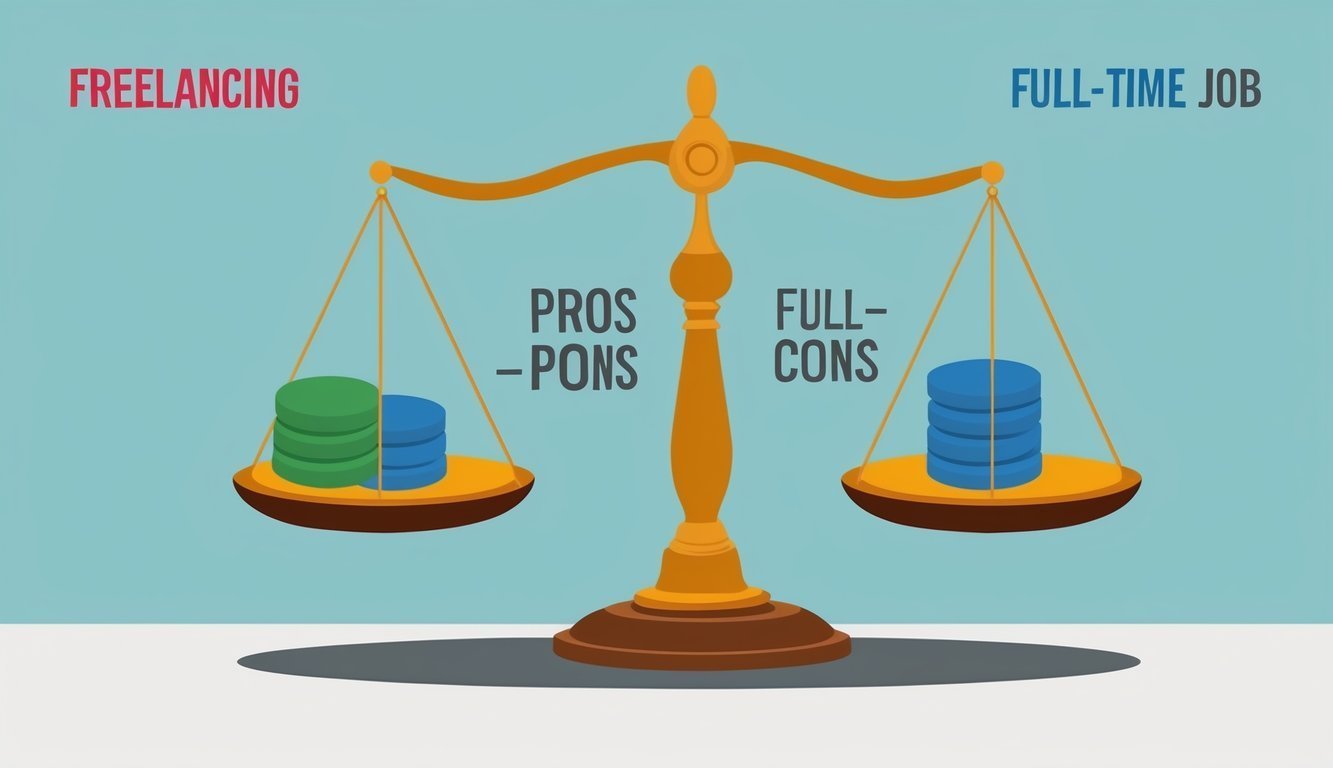When choosing between freelancing and a full-time job, you might find yourself at a crossroads.
Both paths offer unique benefits and challenges that can impact your lifestyle and career trajectory in different ways. Understanding these pros and cons can help you decide which option aligns best with your personal and professional goals.
In the world of work, flexibility and structure often clash.
Freelancing allows you to set your own hours and choose your projects.
Meanwhile, full-time positions typically provide stability and consistent income.
By examining the key aspects of each approach, you can make an informed choice that fits your needs.
1) Flexibility of Freelancing
Freelancing gives you the freedom to set your own schedule.
You can choose when to work, which can be a game changer for your lifestyle.
Whether you’re an early bird or night owl, you can align your work hours with your personal preferences.
You’re not bound by a strict 9-to-5, which means you can take breaks when you need them.
If you have appointments or want to spend a day outdoors, it’s entirely up to you.
This flexibility also allows you to balance multiple projects or clients.
You can choose to take on more work when you have the time, or dial it back when life gets busy.
Additionally, you can work from anywhere.
Whether at home, in a café, or while traveling, all you need is your laptop and internet access.
This adaptability makes freelancing attractive for many, giving you the ability to design a work-life balance that suits you best.
Job Security in Full-time Roles
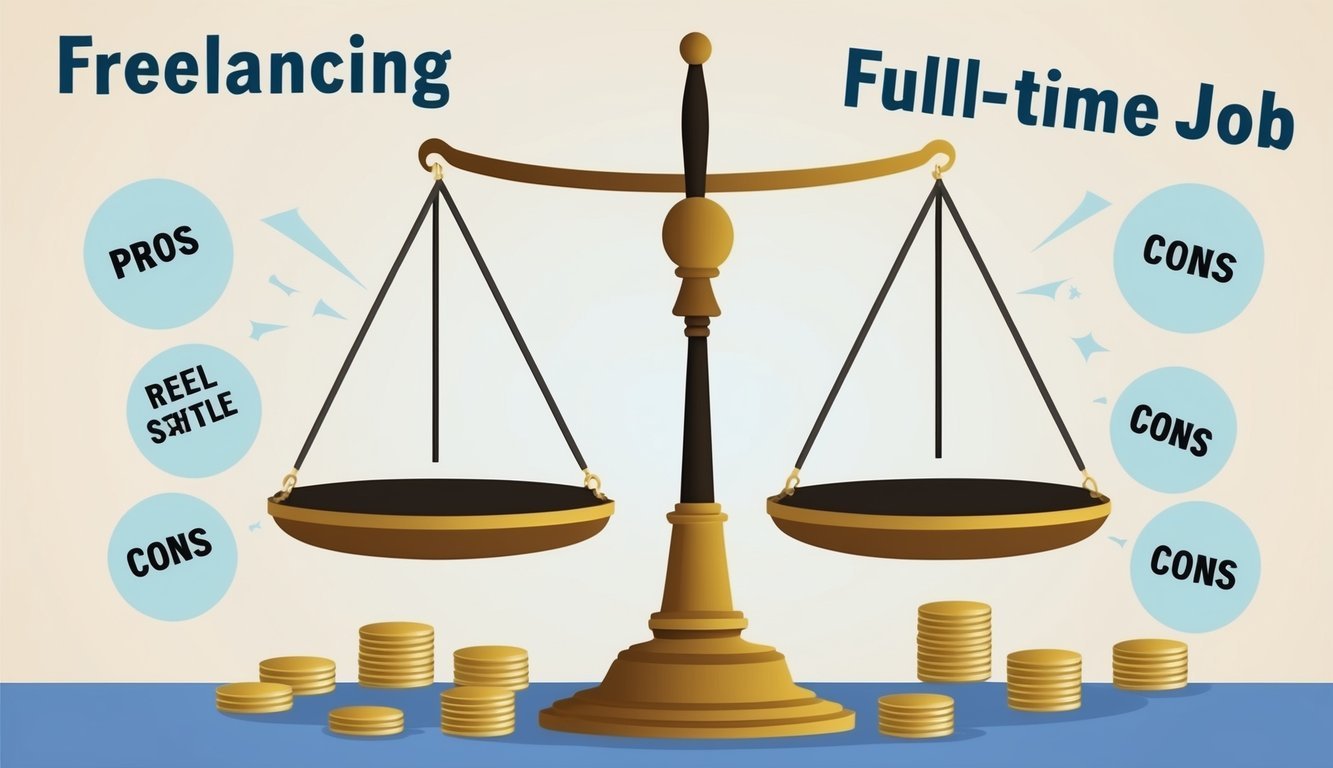
In a full-time job, you typically enjoy more job security than in freelancing.
You’ll receive a consistent paycheck, which makes budgeting a lot easier.
Full-time roles often come with benefits like health insurance and retirement plans.
These perks add a layer of financial stability that freelancers usually lack.
If layoffs happen, you might receive severance packages, which can make transitioning to a new job less stressful.
While no job is entirely secure, full-time employment generally offers a safety net that freelancing doesn’t provide.
This stability can help you plan for your future with more confidence.
When you commit to a full-time position, you also often develop a sense of belonging and loyalty to the company.
This connection can contribute to a more stable work environment.
In contrast, the freelance world can be unpredictable.
One month, you might land several projects, and the next, you could struggle to find work.
That uncertainty can be daunting for many.
3) Varied Projects for Freelancers
As a freelancer, you get to work on a diverse range of projects.
This variety can keep your work fresh and exciting.
You can choose different clients, industries, and types of assignments.
You have the freedom to explore your interests.
If you love graphic design, you might work on everything from marketing materials to branding for various companies.
This exposure helps you build a versatile portfolio.
Freelancing allows you to pick projects that challenge you or align with your passions.
You aren’t stuck with the same tasks every day, which can help avoid burnout.
Switching projects can also stimulate your creativity.
Moreover, each new project may introduce you to different tools and techniques.
This constant learning helps you grow your skill set.
You stay adaptable in an ever-changing job market, making you more competitive.
In short, the variety of projects you encounter can make freelancing a fulfilling experience.
You can tailor your work life to fit your personal and professional growth needs.
4) Steady Income from a Regular Job
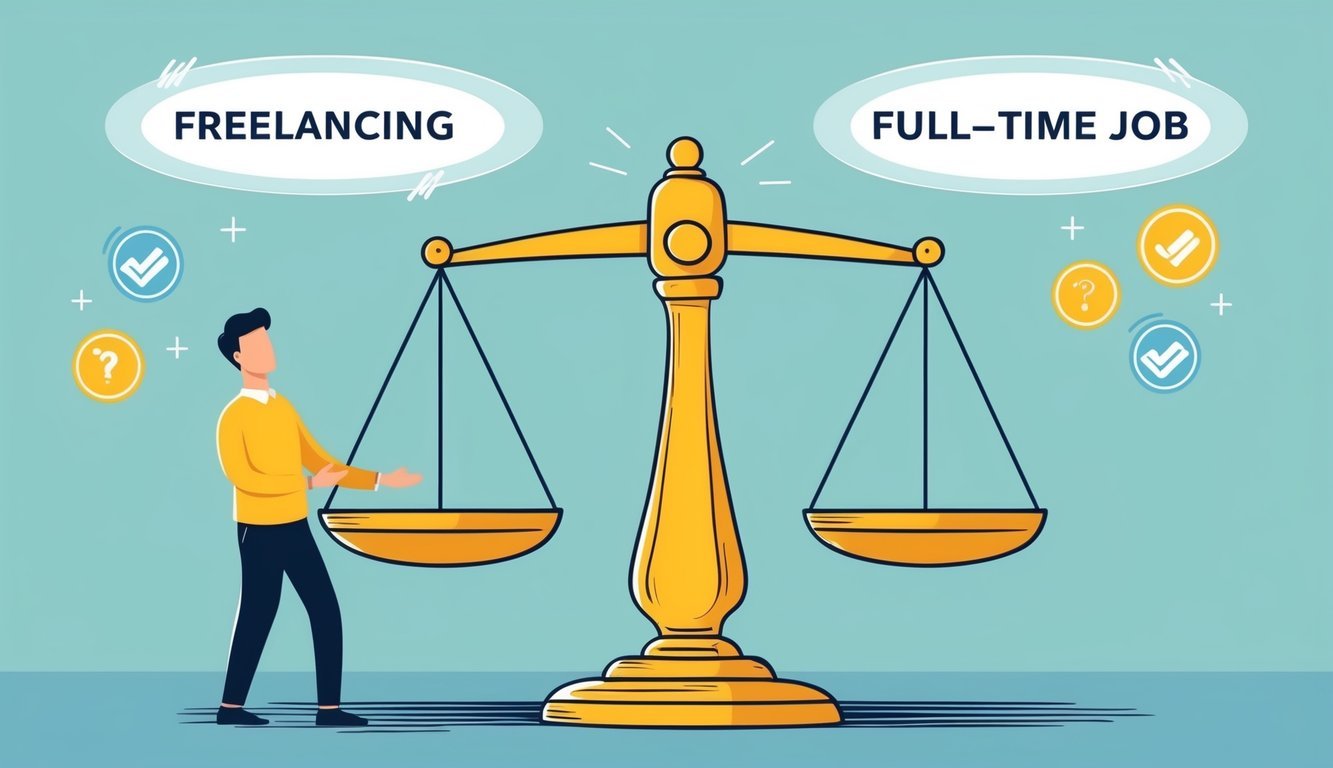
Having a regular job means you can count on a steady paycheck.
This reliability offers peace of mind, especially when managing monthly expenses.
With a full-time position, you don’t have to worry whether you’ll have enough clients or projects each month.
Your income is predictable, which makes budgeting easier.
Many full-time roles come with additional financial perks.
These might include benefits like health insurance, retirement plans, and paid time off.
These benefits can add value beyond just your salary, making your overall compensation package more attractive.
In contrast, freelancers often face income fluctuations.
Some months might be great, while others can be lean.
If you value stability and financial security, a regular job can be a suitable choice.
5) Work-Life Balance as a Freelancer
Freelancing offers you a unique chance to take control of your work-life balance.
You can decide when and where you work, tailoring your schedule to fit your needs.
Whether you prefer early mornings or late nights, it’s your call.
This flexibility allows you to allocate time for family, hobbies, or personal projects without the constraints of a typical 9-to-5 job.
Taking breaks becomes much easier, too.
You can take a few minutes to recharge whenever you need, rather than being stuck at a desk for hours.
However, with this freedom comes a need for self-discipline.
You’ll need to manage your time wisely to ensure that work doesn’t spill into your personal life.
Balancing clients, deadlines, and personal time can be tricky, but many freelancers find ways to make it work.
Overall, the ability to create your own schedule can lead to a more satisfying and enjoyable lifestyle.
6) Office Perks in Full-time Employment
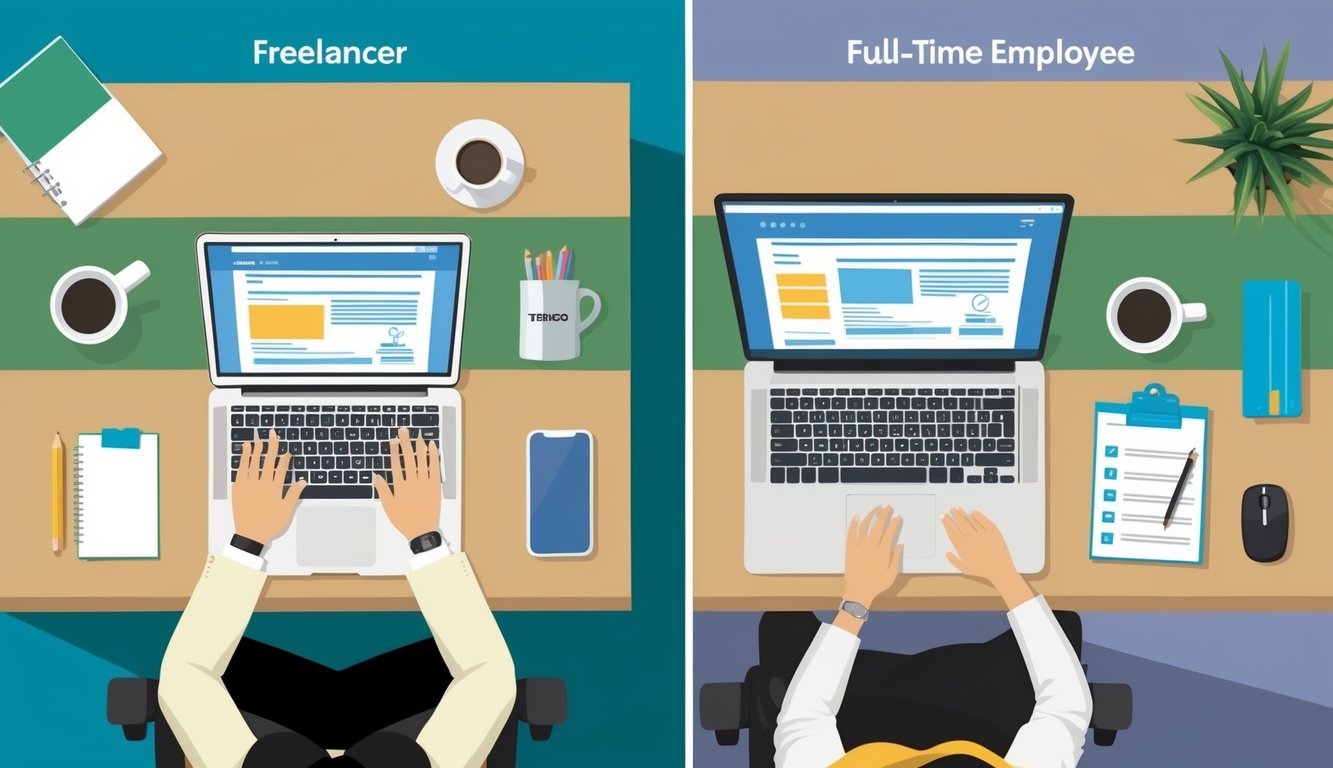
When you take a full-time job, you often get access to a range of office perks.
These can make your work experience more enjoyable and rewarding.
Many companies offer health benefits, including medical, dental, and vision insurance.
This can significantly reduce your out-of-pocket expenses for healthcare.
Retirement plans, like a 401(k), are another perk.
Employers usually match a portion of your contributions, helping you save more for the future.
You might also enjoy paid time off, including vacation days and holidays.
This gives you a chance to recharge without worrying about lost income.
Additionally, some workplaces provide resources like gym memberships or wellness programs.
These can help you maintain a healthy lifestyle while on the job.
Don’t forget about the social aspect, too.
Working with a team can lead to friendships and a sense of belonging that freelance work might lack.
These perks add value to your salary and can enhance your overall job satisfaction.
They create a supportive environment that can help you thrive in your career.
7) Freedom to Choose Clients as a Freelancer

As a freelancer, you have the unique opportunity to select the clients you want to work with.
This means you can align your projects with your interests and preferences.
You can say no to clients whose projects don’t excite you or don’t fit your skills.
This leads to a more enjoyable work experience and can increase your overall job satisfaction.
Working with clients you resonate with can foster positive relationships.
This can lead to repeat business and referrals, helping you build a strong professional network.
You also have the flexibility to set your rates based on the value you bring to a project.
This autonomy can be empowering, as you control your income and work conditions.
Enjoying the freedom to choose your clients can result in a more fulfilling freelance career.
It allows you to focus on what you love and work in an environment that suits you.
This personal choice is a significant advantage of freelancing compared to traditional employment, where you’re often assigned to projects or clients.
8) Career Growth Opportunities in a Full-time Position
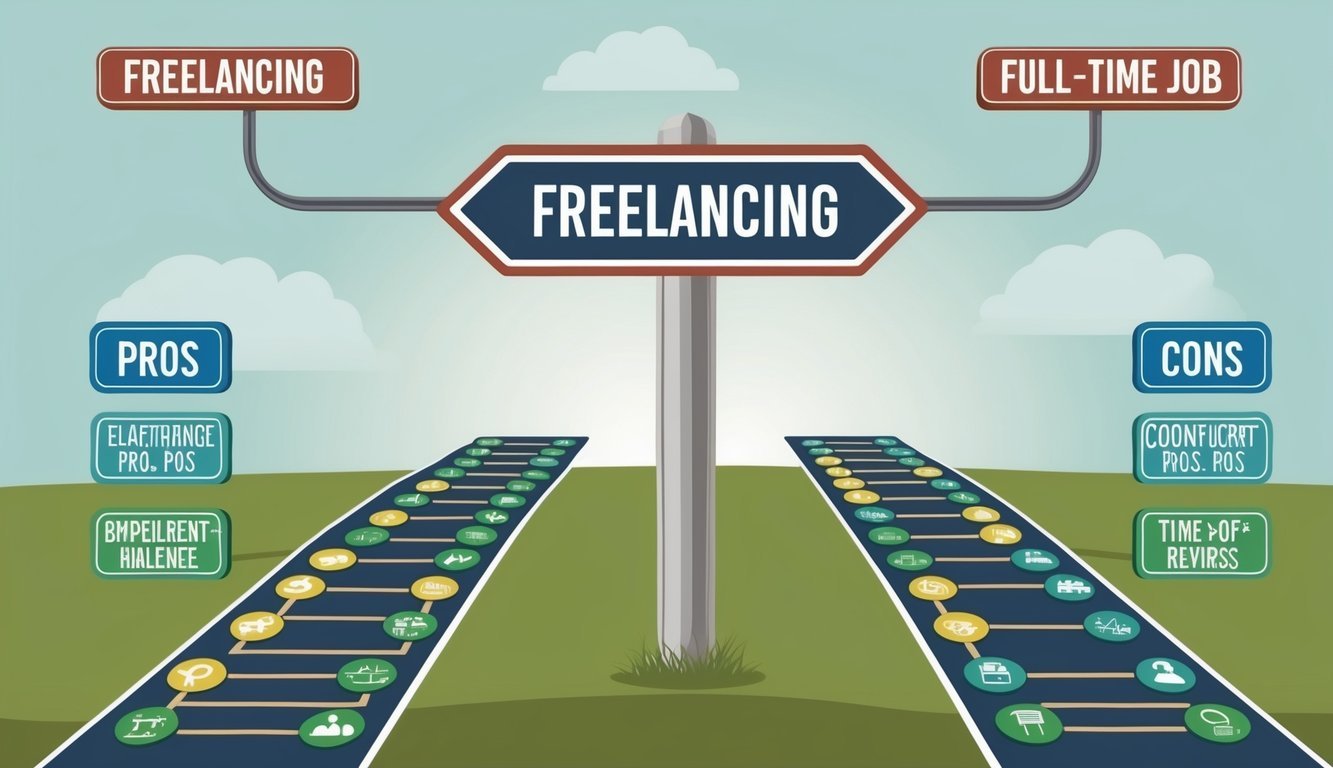
In a full-time job, career growth is often more structured.
Employers typically have a clear path for advancement, making it easier for you to set and achieve professional goals.
You can benefit from mentorship programs and training opportunities.
These resources can help you develop skills that are relevant to your career trajectory.
Full-time positions often come with performance reviews.
Regular feedback can guide your development and help you align with company expectations.
Stability in a full-time job also means you can plan long-term.
As you gain experience and demonstrate your value, promotions and raises become more attainable.
Moreover, many companies offer professional development initiatives.
This support can enhance your expertise and increase your marketability within the industry.
The networking opportunities in full-time roles are valuable too.
You can build relationships with colleagues and industry leaders that may open doors down the line.
Defining Freelancing
Freelancing refers to working independently on a project or task basis for multiple clients instead of committing to a single employer.
This means you can choose the projects you want to undertake, which can be fulfilling for those seeking autonomy.
Freelancers typically manage their own schedules and workloads, making it possible to work from anywhere.
Popular fields for freelancers include writing, graphic design, programming, and consulting.
Key Characteristics:
- Varied Income: Earnings can fluctuate significantly based on project availability and client demand.
- Client Relationships: Building strong connections with clients is crucial for securing ongoing work.
Growth in the Gig Economy
The gig economy has seen significant growth in recent years.
Factors contributing to this trend include advancements in technology and changing workplace attitudes.
This has made it easier for freelancers to find opportunities online.
Platforms like Upwork, Fiverr, and Freelancer connect freelancers with clients looking for specific skills.
This accessibility has broadened the freelance market.
Statistics to Consider:
- As of 2023, over 36% of the U.S. workforce is engaged in gig work.
- Many freelancers report enjoying the ability to choose projects that align with their passions.
The gig economy’s expansion reflects shifting societal values around work-life balance and job satisfaction.
For many, freelancing represents a desirable alternative to traditional employment.
Exploring Full-Time Jobs

When considering full-time employment, it’s essential to recognize its unique advantages and the opportunities for growth that come with it.
Here’s a closer look at the benefits of traditional employment and the potential for career development.
Benefits of Traditional Employment
One of the major benefits of full-time jobs is the stability they offer.
You can expect a regular paycheck, making it easier to budget and plan for your expenses.
This financial predictability often includes benefits like health insurance, retirement plans, and paid time off, which freelancers typically lack.
Full-time roles also provide a structured work environment.
You usually work typical hours and have a clearer separation between work and personal life.
This structure can be helpful for maintaining a healthy work-life balance.
Additionally, you often work as part of a team.
This collaboration can lead to stronger professional relationships, offering networking opportunities that freelancers might miss out on.
Furthermore, working in a team setting allows for the sharing of diverse perspectives and skills, fostering an environment of continuous learning and growth.
In such collaborative contexts, you may also discover online language exchange opportunities that not only enhance your communication abilities but also expand your cultural understanding.
Ultimately, these experiences contribute to a richer professional journey, creating lasting connections that can further advance your career.
Career Development Opportunities
Full-time positions often come with defined career paths.
Companies usually have systems for promotions and raises, meaning your hard work can lead to tangible rewards.
You may also have access to training programs and professional development resources that are less common for freelancers.
Furthermore, being a full-time employee often leads to mentorship opportunities.
You can learn from more experienced colleagues, which is invaluable for your professional growth.
In a full-time role, you may also have the chance to work on diverse projects within the company.
This diversity can enhance your skill set and increase your value in the job market.
Frequently Asked Questions
You might have some questions about the differences between freelancing and full-time jobs.
It’s important to understand the financial aspects, work-life balance, challenges, and job security involved in each option to make an informed choice.
What are the financial benefits of freelancing compared to a full-time position?
Freelancing can offer higher potential earnings, especially if you have specialized skills or a strong client base.
You have the flexibility to set your rates and choose projects that pay well.
However, inconsistent income can be a downside.
How does work-life balance compare when freelancing versus being in a full-time job?
Freelancers often enjoy greater flexibility in scheduling.
You can tailor your work hours to fit your life.
In contrast, full-time jobs usually have set hours that can limit your personal time but provide a predictable routine.
What are the main challenges of freelancing as opposed to a traditional employment arrangement?
Freelancing comes with challenges like finding clients and managing your own business taxes.
You may also face periods of low income.
In a full-time job, the challenges often relate to workplace dynamics and adhering to a structured environment.
Can you highlight the job security differences between freelancing and full-time employment?
Full-time positions generally provide more job security with stable pay and benefits.
Freelancers face more instability as their income depends on client demand and project availability, leading to possible financial uncertainty.
How does freelancing impact professional growth compared to being a full-time employee?
As a freelancer, you may have varied projects that can enhance diverse skills.
However, full-time roles often come with structured development opportunities, mentorship, and clearer career advancement paths.
What are the differences in benefits, like healthcare and retirement plans, between freelancing and full-time jobs?
Full-time employment typically offers benefits like healthcare coverage and retirement plans, which are often part of the job package.
Freelancers need to independently seek and fund their own benefits.
This can be a significant financial and administrative responsibility.


